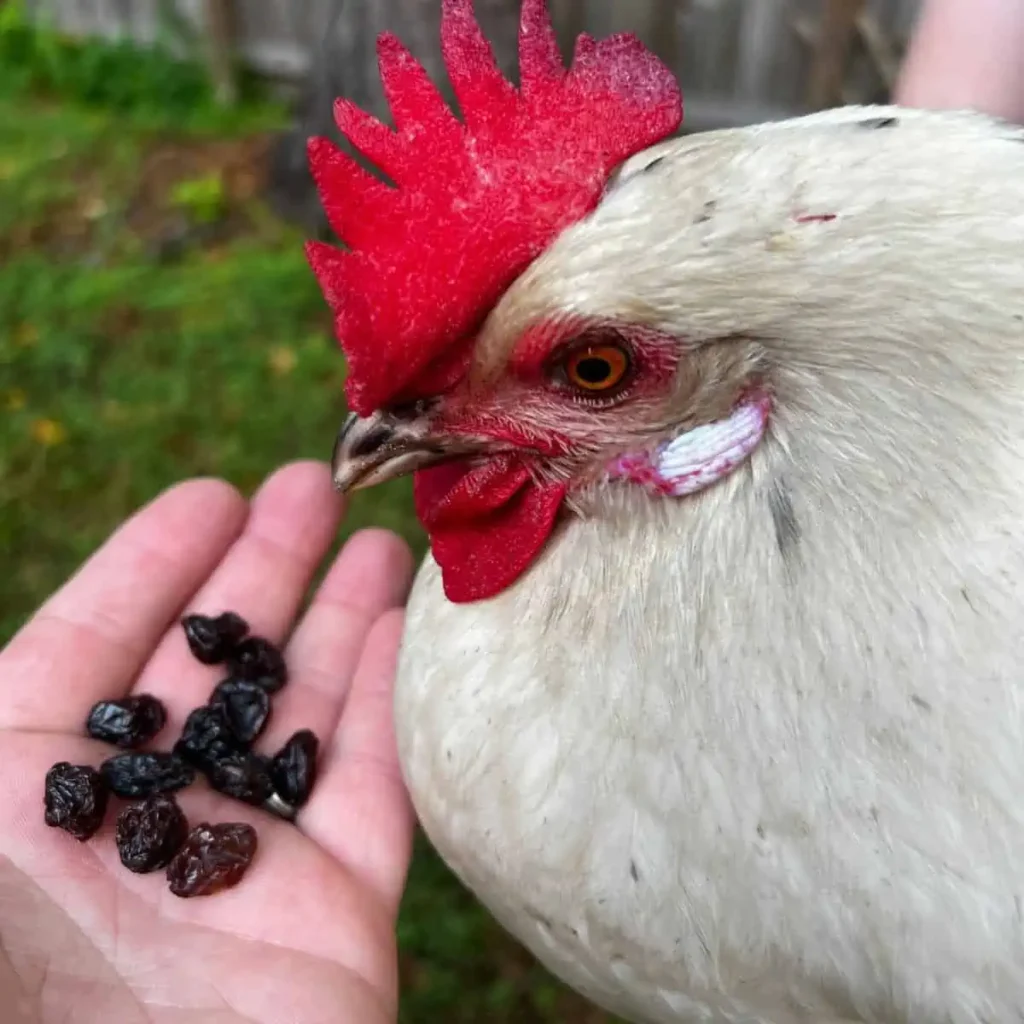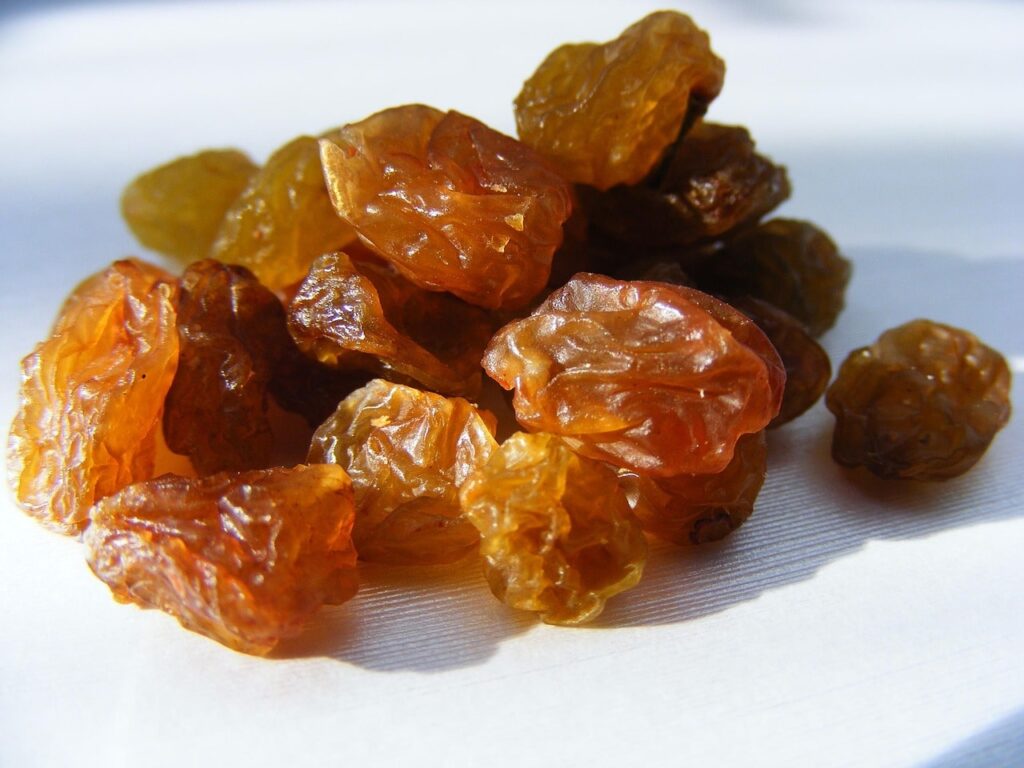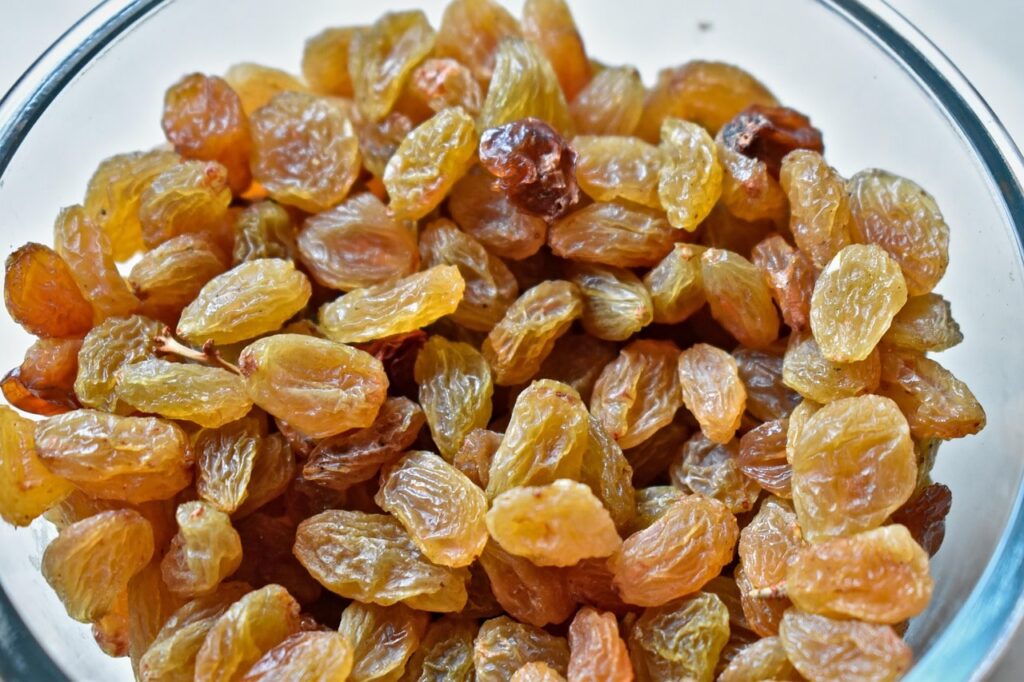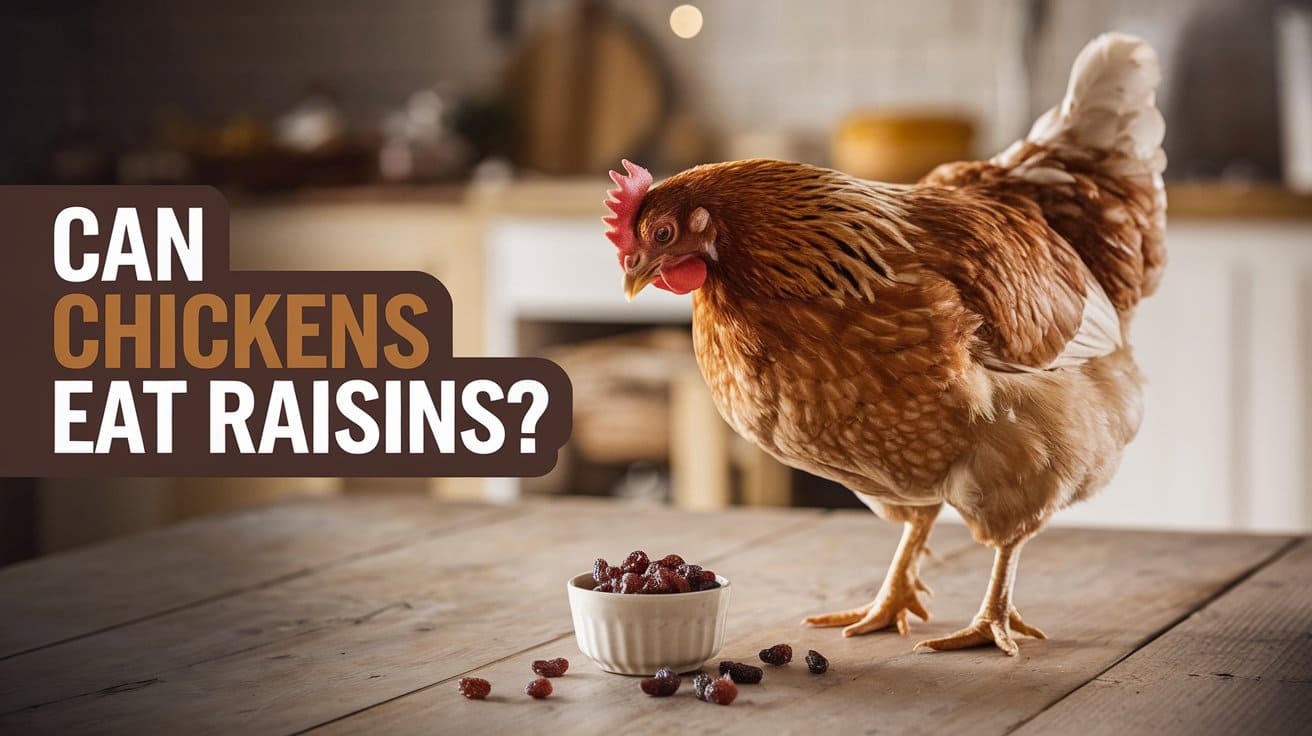Have you ever wondered if your feathered friends can safely snack on raisins? The simple answer is yes, but in moderation. Raisins are tasty and sweet, making them a tempting treat for chickens.
These dried grapes bring a range of benefits, including essential nutrients for their health. But, feeding them the right amount is key, as too much can lead to potential drawbacks. Just like humans, chickens enjoy a snack that’s healthy and an alternative to processed options.
When offering raisins, observe how your chickens pick at this sweet treat while balancing their other nutritional needs. Combining raisins with other berries or treats can make feeding time enjoyable without overindulging.
Watching them enjoy this occasional tart snack can be a delightful experience for both you and your feathered friends, as long as you stay mindful of their overall diet and health.

Table of Contents
ToggleCan Chickens Eat Raisins?
Yes, chickens can eat raisins, but it’s important to be aware of the risks involved. While raisins make a tasty and healthy snack, they should only be given in small amounts. Overfeeding can harm your flock, so always ensure they are fed properly.
Personally, I’ve seen how much my chickens enjoy this sweet treat, but moderation is key. A favorite for many, raisins can be a delightful addition to their diet when balanced well with other foods, ensuring a happy and thriving chicken flock.

Is it Safe for Chickens to Eat Raisins?
While raisins are generally considered safe for chickens, there are a few things to keep in mind. The sugar content in raisins can pose a danger if fed in an excessive amount, leading to weight gain, stress on their body, and even addiction.
This might cause chickens to stop eating their regular food, which could result in health issues like hypoglycemia. Though some people might assume that raisins are as fatal for chickens as they are for dogs, this is not the case.
Fortunately, chickens can enjoy raisins as a treat, provided it’s given in moderation and balanced with their usual food to ensure they remain in good health.
Nutritional Value of Raisins for Chickens
Raisins offer many nutritional benefits for chickens, as they are rich in vitamins, antioxidants, and minerals. According to the USDA FoodData Center, a serving size of 1 cup (145g) of loose, packed, and seeded raisins contains a significant amount of these nutrients.
While the sugar content should be monitored, the overall analysis shows that raisins can be a good addition to their diet in moderation. The table provided by the USDA offers a detailed breakdown, making it clear how beneficial this small treat can be for your flock.
How Nutrients in Raisins Benefit Chickens
Raisins are packed with important nutrients that can improve your chicken’s immune system, support their growth, and enhance its overall health.
Vitamin A helps with eye, skin, and digestive health, while Beta Carotene and other antioxidants protect against oxidative damage and repair cells damaged by free radicals. Vitamin C boosts collagen synthesis, supports joint and immune health, and prevents issues caused by folate deficiency.
Minerals like Calcium, Magnesium, and Iron play vital roles in strengthening bones, improving muscle function, and avoiding problems like anemia or blockage. Even in small amounts, Potassium ensures proper hydration, maintains electrolyte regulation, and protects against heart disease.
The combination of Vitamin E, Vitamin K, and Copper further elevates immune system health, promotes cell regeneration, and assists in digestion. Additionally, Omega 6 Fatty Acids promote healthy feathers, skin, and proper brain development, ensuring your chickens thrive.
Always provide these nutrients in moderation through treats like raisins, grapes, or even fresh vegetables like cucumber, along with a balanced diet. This thoughtful approach not only reduces blood sugar risks but also boosts their energy and supports their long-term well-being.

Hypoglycemia in Chickens
Hypoglycemia in chickens happens when their blood sugar levels drop too low, often caused by eating too many sweets like raisins, berries, or other fruit such as watermelon, cherries, or cantaloupe in a short period of time.
When glucose in the bloodstream is too low, the body’s essential functions can’t run smoothly, leading to problems like feeling dizzy, lethargic, or worse, even death.
This might sound scary, but you can prevent it by monitoring what your chickens eat and ensuring they get proper nutrients through a balanced chicken feed. Offering raisins as an occasional treat ensures they enjoy their snacks without any major risk to their energy levels or overall health.
Drawbacks of Feeding Raisins to Chickens
While raisins can be a yummy treat for chickens, they come with some potential risks if not given in moderation. The sugar content in raisins is naturally high, and too much can lead to excessive weight gain, high-sugar diets, or even death in extreme cases.
Additionally, tannins in raisins, which give them a slight metallic taste like black tea, can block the absorption of iron and protein, which are especially important for laying hens. However, the amount of iron in raisins outweighs the problem if fed properly.
Another major drawback is the hazard of choking, suffocation, or impaction, particularly for chicks, juveniles, or smaller chickens. Since raisins are sticky and chewy, they can get stuck in a chicken’s beak or throat, causing them to suffocate.
Their tough skin can also collect in their crops, leading to impacted crops, which is a serious condition requiring immediate attention. To reduce these risks, always ensure raisins are fed in small amounts and prepared properly to avoid any blockage or health issues.
How to Feed Raisins to Chickens
Feeding raisins to chickens can be done in different ways, but the right method ensures they enjoy their treat safely. For a quick option, scatter raisins like scratch feed, but keep in mind this is the easiest method and can sometimes make them difficult to digest.
A better approach is to soak the raisins in lukewarm water or leave them in a jar overnight to soften them. This makes them easier for your chickens to chew and improves their hydration. I often cut the soaked pieces into small sizes to avoid choking, especially for younger or smaller hens.
If you want to make it fun and enrich their day, you can try creative ideas like mixing raisins into a chicken trail mix. Add other healthy treats such as berries, nuts, meal worms, corn, flaxseed, and sunflower kernels to create a tasty blend.
Alternatively, let your chickens go “bobbing for raisins” in a dish of water, which keeps them entertained and boosts their hydration. Whichever method you choose, keep the serving size small, like a teaspoon or a tablespoon, and follow the 90/10 ratio to maintain a healthy diet.
Final Thoughts on Feeding Raisins to Chickens
Feeding raisins to chickens can be a great way to offer them a tasty treat, but it’s important to approach it with moderation and care.
While raisins are packed with healthy nutrients and can be beneficial as an occasional snack, they can also pose problems if not prepared properly. Always soak them to rehydrate them and cut them into smaller pieces to avoid choking or impaction.
By keeping the amount limited and addressing these drawbacks, you can ensure that raisins remain a safe and enjoyable part of your chickens’ diet.




